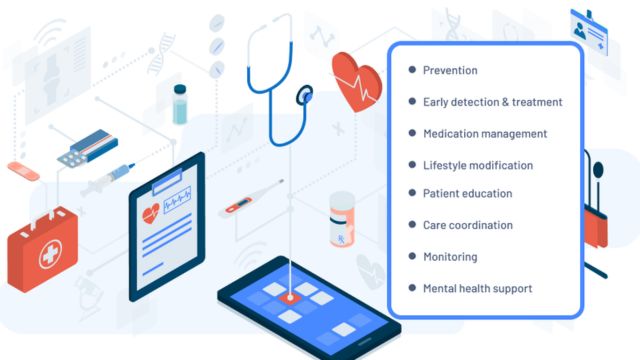Technology has fundamentally changed many industries in recent years, including healthcare. The proliferation of smartphone apps has transformed our approach to mental health, physical activity, and chronic illness control. Apps for healthcare have made it simpler for people to monitor their health, seek tailored treatment, and get advice on preserving general wellness. These developments allow consumers to travel a more proactive, customized healthcare path.
1. Fitness Apps: Transforming Physical Health
Offering users a broad spectrum of tools to enhance their physical condition, fitness apps have grown to be pillar of modern health and wellness. These programs provide customized exercise experiences by using data tracking, bespoke workout regimens, and artificial intelligence-based recommendations. The following are some ways fitness applications are altering the scene:
- Personalized Fitness Plans:
Many fitness apps now offer personalized workout routines based on a user’s goals, fitness level, and preferences. For example, apps like MyFitnessPal and Fitbit provide customized fitness plans based on daily activity tracking, calorie intake, and workout history. This personalization ensures that the routines are effective and aligned with each individual’s needs. - Real-time Feedback and Progress Tracking:
One of the most innovative features of fitness apps is the ability to provide real-time feedback. Fitness apps like Strava and Nike Training Club track your movements, monitor your heart rate, and provide instant feedback on form and performance. This feature helps users adjust their workouts in real time, preventing injuries and maximizing results. - Integration with Wearable Devices:
The integration of wearable devices, such as Fitbit and Apple Watch, with fitness apps has taken health tracking to the next level. Wearables track metrics like heart rate, steps, calories burned, and sleep quality, all of which are synced with fitness apps for a comprehensive analysis. This integration allows users to monitor their progress across multiple aspects of their physical health.
2. Mental Health Apps: Breaking the Stigma and Promoting Well-being
Managing emotional well-being now depends much on mental health applications. These apps give people easy access to mental health resources and a stage on which to control stress, anxiety, and other mental health issues. Among these noteworthy developments in this field are:
- Therapeutic Support Through AI:
Mental health apps such as Woebot and Wysa utilize artificial intelligence (AI) to provide cognitive-behavioral therapy (CBT) in an interactive, conversational format. Users can chat with AI-powered bots, which use proven therapeutic techniques to help manage symptoms of depression, anxiety, and stress. This technology makes therapy more accessible, particularly for individuals who may not have access to in-person therapy. - Mindfulness and Meditation:
Apps like Headspace and Calm have made mindfulness and meditation more accessible to people worldwide. These apps offer guided meditation sessions, breathing exercises, and sleep aids, all designed to reduce stress, improve sleep quality, and foster emotional resilience. They also incorporate features like mood tracking and daily reminders to help users stay on track with their mental health journey. - Virtual Therapy and Support Groups:
Many mental health apps are also incorporating virtual therapy and online support groups. For instance, BetterHelp and Talkspace connect users with licensed therapists for online sessions via text, audio, or video. This convenience has broken down barriers to mental healthcare, such as stigma and location constraints, making it easier for people to seek support whenever they need it.
3. Chronic Disease Management Apps: Empowering Patients to Take Control

One of the most significant uses for healthcare apps is management of chronic diseases. These programs help people with disorders including diabetes, hypertension, asthma, and heart disease monitor their health and more successfully manage their symptoms. Innovations in apps for managing chronic diseases are enabling individuals as follows:
- Continuous Monitoring of Vital Signs:
Many chronic disease management apps integrate with medical devices to provide real-time tracking of vital signs. For example, Diabetes M allows diabetic patients to monitor their blood sugar levels and log their daily activities. This continuous monitoring helps individuals stay on top of their health and make necessary adjustments in real-time, such as insulin dosing or medication. - Medication Management:
One of the significant challenges for individuals with chronic diseases is adhering to medication schedules. Apps like Medisafe help users track their medication intake and remind them to take their medications on time. This feature is crucial for conditions like hypertension and diabetes, where consistent medication adherence is essential for effective disease management. - Patient-Doctor Communication:
Telemedicine has become increasingly popular, especially in the wake of the COVID-19 pandemic. Chronic disease management apps like MyChart enable users to communicate directly with healthcare providers, share health data, and receive virtual consultations. This direct line of communication fosters a more personalized care experience and allows for timely adjustments to treatment plans. - Educational Resources and Health Insights:
Apps such as CardioSmart (for heart disease) and AsthmaMD (for asthma) offer educational resources and actionable health insights to help individuals understand their condition better. These apps provide users with tips on managing their symptoms, understanding triggers, and improving their quality of life through healthier lifestyle choices.
4. The Future of Healthcare Apps:
Promising developments abound in the field of healthcare apps going forward. Personalizing treatment and offering practical insights will still depend much on artificial intelligence, machine learning, and advanced data analytics. Furthermore, the combination of digital health records, wearable devices, and telemedicine will provide patients with more flawless experiences enabling them to obtain complete treatment right at their hands.
The growth of integrated care systems—which mix mental health assistance, chronic illness management, and fitness tracking—that fit into a single app is also quite exciting. From physical exercise to mental health and disease management, these all-encompassing solutions will help consumers more successfully manage their general well-being.
Conclusion
Innovations in healthcare apps for fitness, mental health, and chronic disease management are transforming how we approach wellness and healthcare. With personalized fitness routines, AI-powered mental health support, and advanced disease management tools, these apps are empowering individuals to take control of their health in ways that were once unimaginable. As technology continues to evolve, healthcare apps will play an increasingly important role in improving overall health, accessibility to care, and enhancing the quality of life for individuals worldwide.













